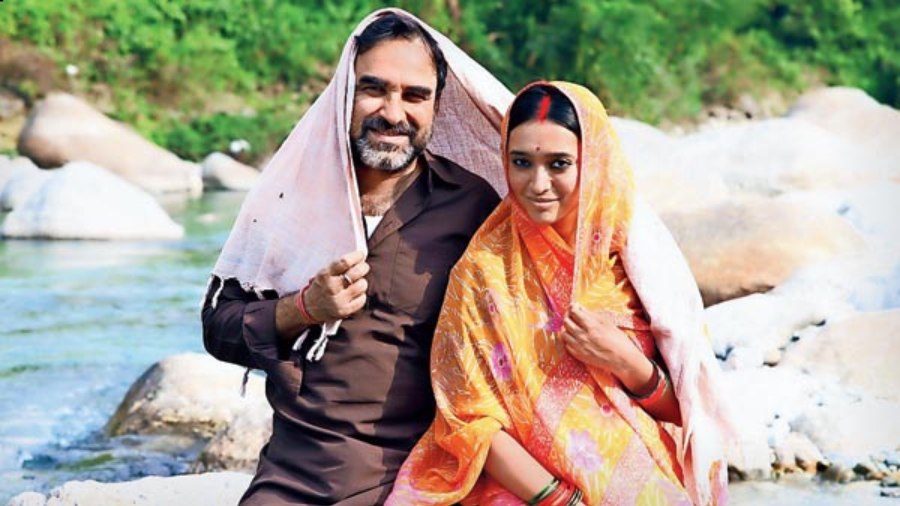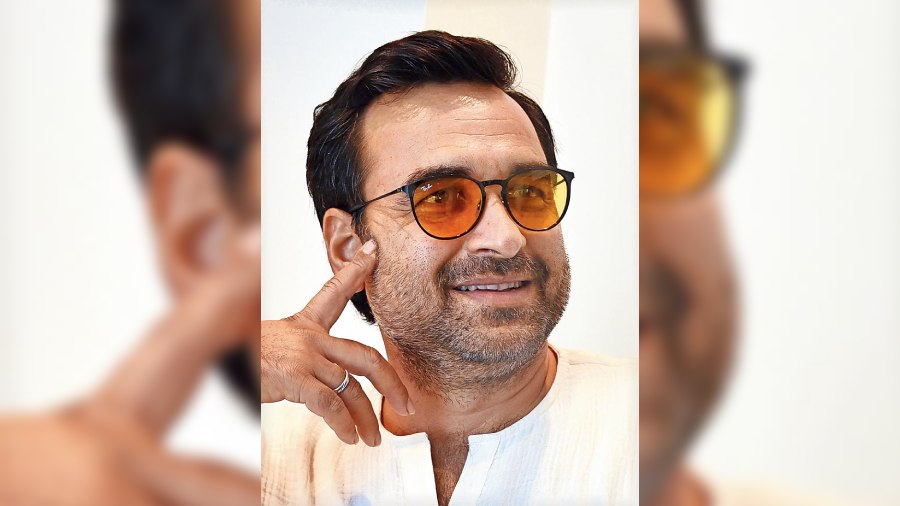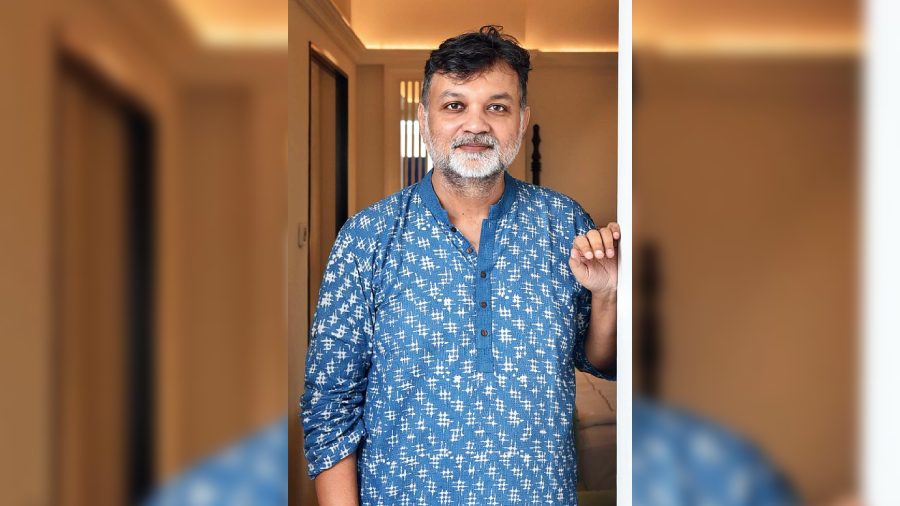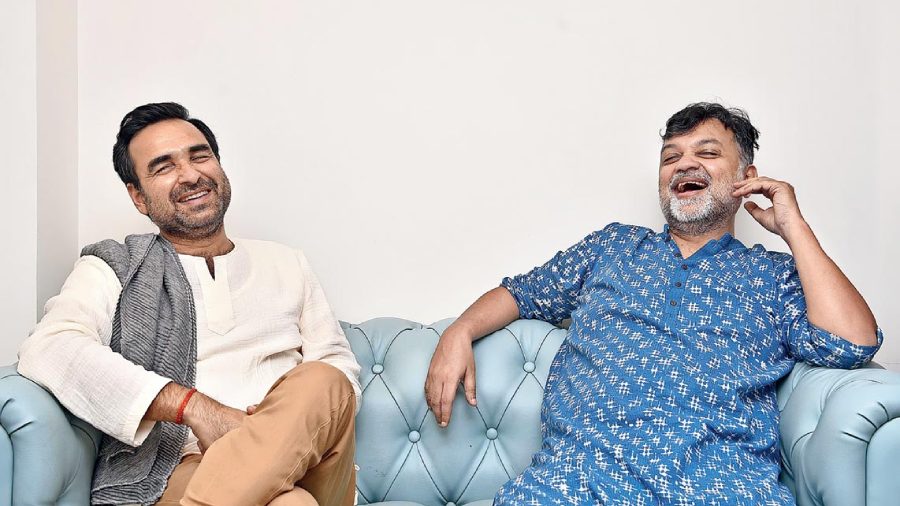Actor Pankaj Tripathi and director Srijit Mukherji join forces for Friday film Sherdil: The Pilibhit Saga. Drawn from real-life events, the film is shouldered by Tripathi, with Neeraj Kabi and Sayani Gupta co-starring. On Monday afternoon, The Telegraph caught up with the actor-film-maker duo at Taj Bengal for a chat on Sherdil that Srijit describes as “an experience-driven, worldview-driven satire”.
We know that Sherdil is based on real events. What was the genesis of the film?
Srijit Mukherji: The genesis of the film was actually a newspaper article that came out in 2017, if I am not wrong. It spoke about a particular practice in the Pilibhit Tiger Reserve where elderly people were being left in the jungle by their families to be hunted down by tigers so that the compensation offered by the government could be claimed. I found that bizarre, I found it tragic, and I found it socially telling. I wanted to give it a more satirical and a heroic twist. I wanted to present it like a satire, rather than a tragic, morbid story.
So I fictionalised the jungle, I fictionalised the village and I fictionalised the village headman called Gangaram (played by Pankaj Tripathi) who voluntarily goes into the forest to get killed by a tiger so that he can claim a compensation that will save the village.
The village is suffering from a lot of things, all of which boils down to poverty. Be it the crops being spoilt by animals, be it floods one year and drought the next year. These have actually been real-life inputs from Pankaj ji himself. He told me that these kinds of problems keep on happening in rural India.
In the Pilibhit case, when the police found out, the villagers’ defence was that they went into the jungle voluntarily... no one forced them. So we have made this a satirical saga of a Don Quixote kind of character, who is Gangaram.
Pankaj, you had told me that Srijit had pitched Sherdil as a one-line story to you during Durga Puja a few years ago. What intrigued you the most about the story?
Pankaj Tripathi: Just the basic yet mindboggling story of a man who voluntarily wants to get killed by a tiger so that his village gets the compensation. I have always been a nature and jungle lover and wanted to stay in the jungle while shooting a film. When Sherdil was pitched to me, I thought that this could be that film that would take me into the jungle. This story itself is so unbelievable that you will keep asking yourself, ‘Aisa ho sakta hain kya?’
Since the story is so unreal, we put in quite a bit of logic because the urban audience may not be able to wrap their heads around it. We had to make it cinematic, put in quite a bit of logic....

Pankaj Tripathi with Sayani Gupta in Sherdil: The Pilibhit Saga, releasing in theatres on June 24
Pankaj, you hail from rural Bihar. Have you come across stories of a similar kind?
Pankaj: A government official had once told me that when the government has to give money to the public through a scheme, then the number of families in a certain block increase deliberately in numbers in order to avail that. However, when the public has to give money to the government, then the numbers somehow go down! (Laughs) Jab lene ki baari aati hain toh do bhai do alag parivaar ho jaate hain; jab dene ki baat aati hain toh woh ek parivaar ho jaate hain. I found this very interesting. But that has nothing to do with the story in our film.
I have, of course, always been aware of the problems that farmers in our country face. How their crops get ruined because of certain animals. In my village, we rarely had any nilgais till a few years ago and now they have become rampant in Bihar. They come and destroy the crops at night.
Srijit is a huge wildlife enthusiast. Are you one too?
Pankaj: Yes, yes! When I called him last week, he was at Tadoba National Park and I was at Panna National Park!
Srijit: He was like, ‘Aap kahan ho?’ I said, ‘Jungle mein’. I asked him, ‘Aap kahan ho?’ He said, ‘Jungle mein!’ (Both laugh)
Pankaj: I was close by shooting for Fukrey (3) and we went by boat early in the morning and actually spotted two tigers! (Smiles)
Srijit: Our promotions for Sherdil actually started from there, inadvertently! (Laughs)
Pankaj: The whole unit of Fukrey 3 was staying in a big hotel, but I insisted on staying in the forest guest house of Madhya Pradesh tourism. At night, I could hear the sounds of peacock, deer and spotted deer and I would sit in the dark for an hour every night and just hear them (smiles).
This is an interesting collaboration. Was working with each other everything you hoped it would be?
Pankaj: It was a fantastic experience. Before we started shooting, I was completely blank about what we were going to do. But he (gestures towards Srijit) just said, ‘Let’s go into the jungle with the camera and see what happens’. Both of us had a very organic approach. I would wake up in the morning aur pata chalta tha ki Srijitda kho gaye hain kahin jungle mein! (Both laugh)

Before we started shooting, I was completely blank about what we were going to do. But he (gestures towards Srijit) just said, ‘Let’s go into the jungle with the camera and see what happens’. Both of us had a very organic approach. Even when I improvise, I ensure that the content doesn’t get diluted. The character should be seen, his innocence and honesty should be seen... Pankaj Tripathi shouldn’t be seen — PANKAJ
But it wasn’t Anurag Basu-level organic, right?
Srijit: No, no! (Laughs)
Pankaj: Unka (Anurag Basu) toh alag hi hain. Inka (Srijit) toh set at least jungle mein poora tha. Anuragda ka set toh aaj kamra bathroom hota hain, kal usi kamre mein pata chala bedroom ka scene shoot kar rahein hain! (Laughs) If you ask him, he will say ki kum budget mein aise hi shoot karna padta hain (smiles). He will be like, ‘You exited that room, now think that you jumped into another room’. And I tell him, ‘Forget it... aap bolo kya karna hain’ (laughs).
For Sherdil, we had quite a few story sittings and I knew exactly what the script was all about. But more or less, it was an organic process. I am also someone who doesn’t go overprepared or with that rigidity that a certain scene can be performed only in a specific way....
Srijit, what was it like working with an incredible actor like Pankaj Tripathi?
Srijit: Oh, incredible, incredible! I wrote a very linear script and both of us decided that it’s too straightforward because story mein koi mazaa nahin aa raha hain. It’s anyway a very dark subject and our thing was to make it entertaining, and most importantly, satirical. We wanted an element of intrigue, and hence the non-linearity. It couldn’t be preachy. We were very sure of the fact ki humein lecture nahin dena hain. We wanted to tell a story and if something arose from that then that’s great. But our main thing was that the audience should get engaged. This engagement comes through structure, through improvisation of lines, which he (looks at Pankaj) is so good at.
Pankaj had two lines to say, but the three lines that he spoke on his own after that would take the scene to a whole different level. I couldn’t control my laughter, so much so that I would forget to say ‘cut’ sometimes. He does things on the spot and then asks, ‘Yeh rakhe?’ And I was like, ‘Rakhenge toh zaroor... aap please karte rahiye’.
See, the film-making process is essentially fake, in the sense that we mimic reality. Life is not scripted. We want to see life on screen, but the irony is that we want people to act out life on screen. Pankaj picks a line and takes it somewhere else, but technically he’s very strong and keeps to his cues so that his co-actor is not taken by surprise. Keeping all that in mind, what he presents ultimately is three or four times bigger than what is in the script. With him, the lines that you have written start throbbing with life.
Obviously along with him, Shantanu (Moitra) has contributed, Gulzaar saab has written the lyrics.... Neeraj (Kabi) is brilliant in the film and Sayani (Gupta) is outstanding. This was a very happy unit. I think happiness is very important in film-making. Whether you like the film or not, when you watch it, you will understand that it was a very happy unit working together. That’s because everyone was giving more than what he or she usually brings to the table.
Pankaj and I used to go to the forest at 5am, before anyone else. We would sit and talk about life in general, about the jungle, retirement ke baad kya karna hain (smiles), what is happening to India, and this and that.... And suddenly, in the middle of the conversation, he would start walking and I would suddenly switch on the camera. That is how the shoot happened.
Pankaj: Bahut mazzedaar process tha. But even when I improvise, I ensure that the content doesn’t get diluted. The character should be seen, his innocence and honesty should be seen... Pankaj Tripathi shouldn’t be seen.
My conversations are very organic even in life. Like my wife (Mridula) and I will be talking about something important and suddenly I will look at the curtains in the room and say, ‘Yeh parde ka fall bahut light hain na?’ (Smiles) And she gets zapped!
Srijit, I know it’s the producers’ call, but wouldn’t Sherdil have been more suitable for a streaming release?
Srijit: I also believe the same. But as you said, it’s the producers’ call and there are many things in heaven, earth and contract, Horatio (laughs) that us film-makers have to ignore. Pankaj, you have anything to say?
Pankaj: I just act. Where it releases, when it releases, how much it earns... I don’t really put my mind to things like that. I anyway don’t understand why the audience is interested in how much a film earns at the box office. Judge a film for what it is.
Srijit: I can tell you that this particular theatrical release is much more relaxed because the budget and the marketing has been covered by the music rights and the web deal, with a little bit of profit, in fact. Whatever happens at the box office will be a bonus.
Pankaj: Yeh pressure waali film hi nahin hain.
Srijit: It’s an experience-driven, worldview-driven satire, which, hopefully, people will enjoy.

Pankaj and I used to go to the forest at 5am, before anyone else. We would sit and talk about life in general, about the jungle, retirement ke baad kya karna hain, what is happening to India.... And suddenly, in the middle of the conversation, he would start walking and I would suddenly switch on the camera. That is how the shoot happened — SRIJIT MUKHERJI
Srijit, everyone talks about Pankaj Tripathi the actor. What do you have to say about him as a person?
Srijit: For me, he’s an India who I haven’t met before. He gives me an insight into things that I had no clue about in my urban existence. He adds that completeness, that worldview, that perspective to me that after interacting with him, I come out as a more enriched person... a person who knows many more sides of my country, my villages, my rivers, my forests....
My existence in totality has become far more complete after I have befriended Pankaj. He connects me to that India from which I am obviously removed. Actually, Pankaj the human being is the bridge between me and the actual Gangaram. There is a Gangaram that I had written in English. Atul Rai and Sudeep Nigam (the film’s co-writers) made it more Gangaram. Finally, Pankaj came in and he made it Gangaram in flesh and blood.
Srijit, is there a defining Pankaj Tripathi performance for you?
Srijit: I would pick Gurgaon. It’s chilling, and it’s not spoken about that much. I was just blown away. If you watch Gurgaon and Stree one after another, it’s very difficult to believe that the same man has played both. People obviously talk about Mirzapur and Newton, but I really love him in Gurgaon.
On a lighter note, Pankaj, as the jamai of Bengal, what kind of pampering did you get on Srijit’s sets?
Pankaj: Bangla khana! Ek spot boy thhe Jhantuda... itna achha khana milta tha. On every set, I make khichdi for myself. This was a set on which I didn’t have to make my own khichdi because the food was so good! I love Bengali food... as soon as I came in today, I had paturi (smiles).
Srijit: Food is a very important thing on my set. No compromises on that!
Pictures: B. Halder
